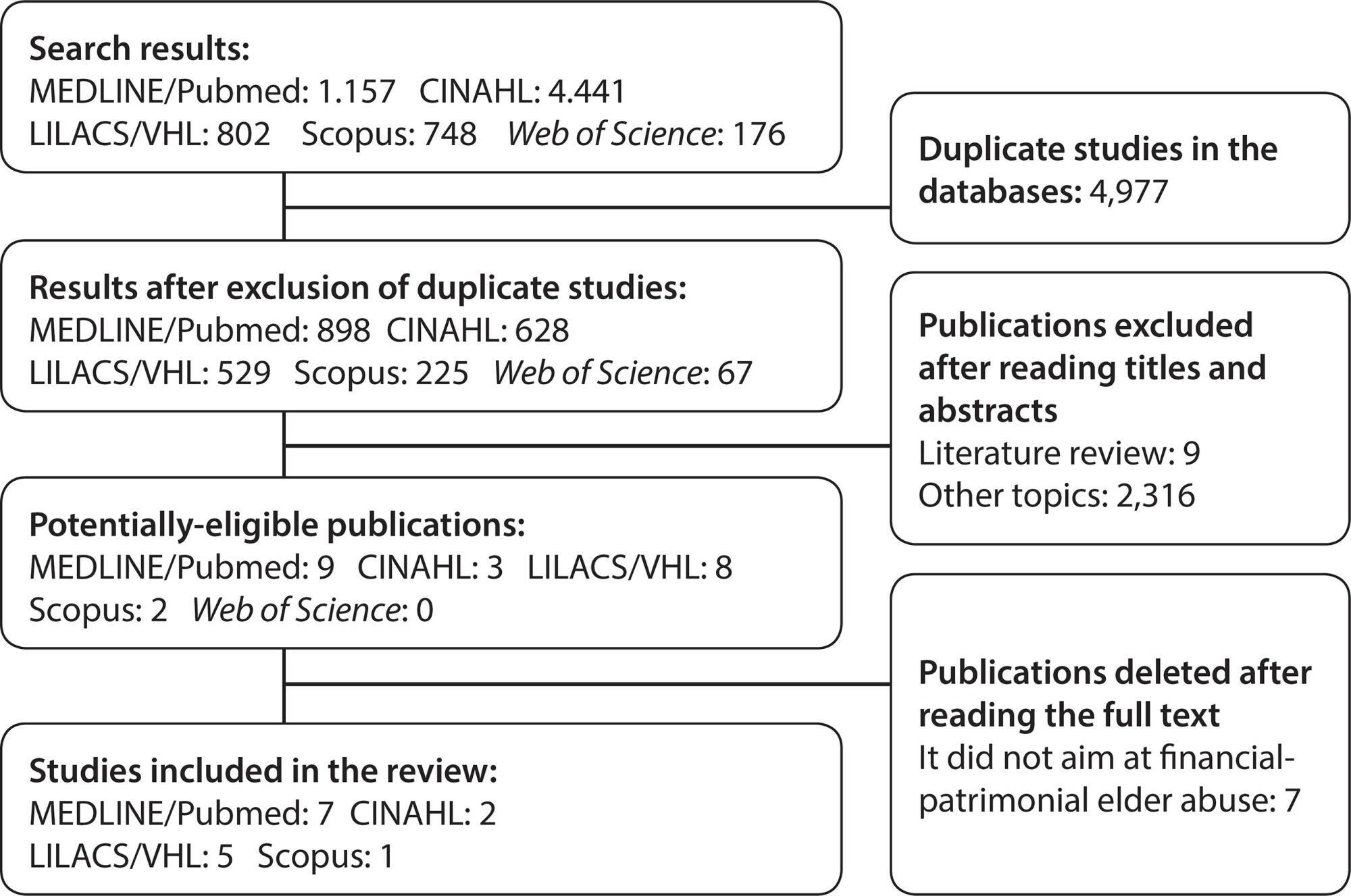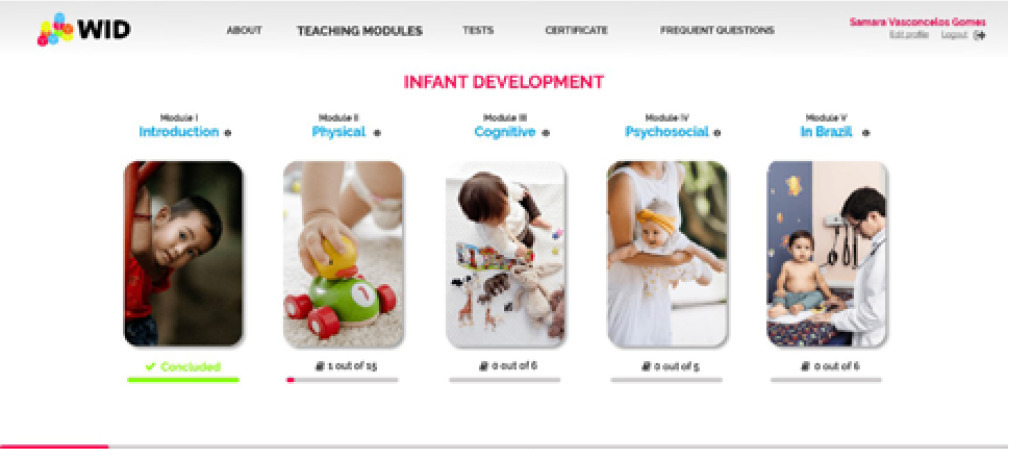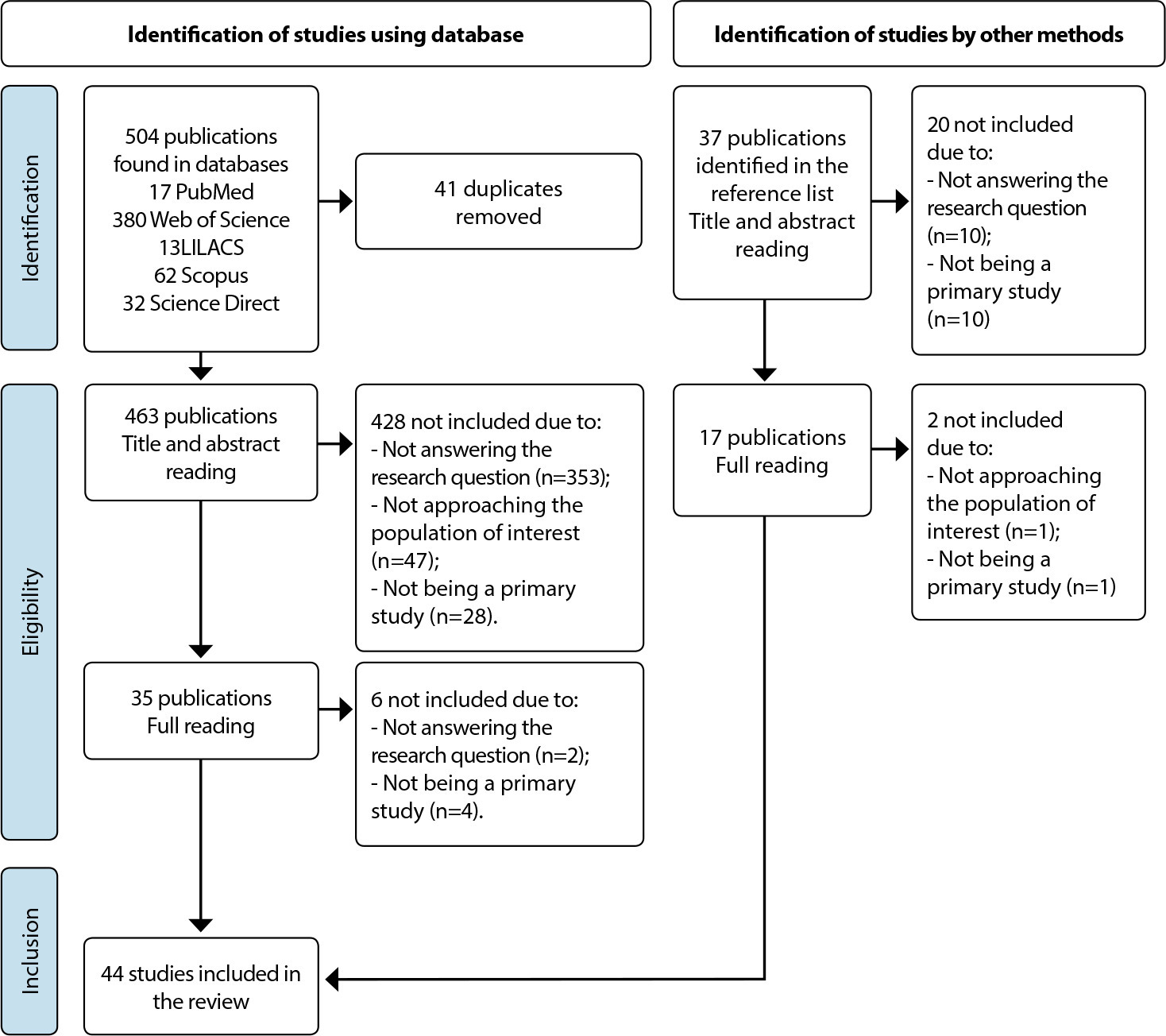-
01-01-2016
ERRATUM
Revista Brasileira de Enfermagem. 2016;69(5):1002-1002
Abstract
ERRATUM
Revista Brasileira de Enfermagem. 2016;69(5):1002-1002
DOI 10.1590/0034-7167.20166905e01
Views0Article “Alcohol and alcoholism: attitudes of nursing students”, with number of DOI: http://dx.doi.org/10.1590/S0034-71672013000100013, published in the journal Revista Brasileira de Enfermagem, v66(1):84-9, page 89 that read: “18. Miranda SP, Vargas D. Satisfação de pacientes de um centro de atenção Psicossocial álcool e drogas com o atendimento do enfermeiro. SMAD, Rev Eletrônica Saúde Mental Alcool Drog […]See more -
01-01-2016
Research methodology for nursing and health: a book review
Revista Brasileira de Enfermagem. 2016;69(5):1000-1001
Abstract
Research methodology for nursing and health: a book review
Revista Brasileira de Enfermagem. 2016;69(5):1000-1001
DOI 10.1590/0034-7167-2015-0135
Views1For those interested in nursing and health, the book entitled “Research methodology for nursing and health: from theory to practice”() was released in October 2015, at the 67th Brazilian Congress of Nursing, sponsored by National ABEn. The interest emerged from two organizers: Dr. Maria Ribeiro Lacerda (UFPR) and Dr. Regina Gema Santini Costerano (UNIFRA). Forty-seven […]See more -
01-01-2016
Violence in the workplace in Nursing: consequences overview
Revista Brasileira de Enfermagem. 2016;69(5):996-999
Abstract
Violence in the workplace in Nursing: consequences overview
Revista Brasileira de Enfermagem. 2016;69(5):996-999
DOI 10.1590/0034-7167-2015-0133
Views0See moreABSTRACT
Objective:
to reflect on the consequences of workplace violence experienced by nursing professionals.
Methods:
this is a reflection paper based on recent publications related to the subject, particularly researches carried out in Brazil and in other countries.
Results:
exposure to workplace violence has been associated with health problems in nursing professionals, which may be physical damage, emotional manifestations, and psychic disorders. It also affects the employee performance, his or her family and social interactions.
Conclusion:
this phenomenon is potentially noxious and costly, for it leads to suffering, illness, absence from work, and even death. This reflection calls attention moreover to the importance of a safe and adequate health care work environment.
-
REFLECTION01-01-2016
Construcción de la enfermera de práctica avanzada en Catalunya (España)
Revista Brasileira de Enfermagem. 2016;69(5):991-995
Abstract
REFLECTIONConstrucción de la enfermera de práctica avanzada en Catalunya (España)
Revista Brasileira de Enfermagem. 2016;69(5):991-995
DOI 10.1590/0034-7167.2016690507
Views0RESUMEN
El desarrollo de la enfermera de práctica avanzada (EPA) ha supuesto un reto para las enfermeras en países como EE.UU., Canadá, Gran Bretaña y Australia, entre otros, y desde hace escasos años está siendo considerada en Catalunya y España como un sistema para desarrollar nuevos roles que aporten eficacia y eficiencia al sistema sanitario. El presente artículo pretende conceptualizar la EPA y los modelos de referencia así como contextualizar y reflexionar sobre la EPA en Catalunya, desde el punto de vista de formación y de la implantación de los denominados nuevos roles de enfermería, asimilándolos a la práctica avanzada.
Keywords:Competencia ClínicaEnfermeríaEnfermería de Práctica AvanzadaPráctica ProfesionalRol de la EnfermeraSee more -
01-01-2016
Developing the Advanced Practice Nurse in Catalonia
Revista Brasileira de Enfermagem. 2016;69(5):991-995
Abstract
Developing the Advanced Practice Nurse in Catalonia
Revista Brasileira de Enfermagem. 2016;69(5):991-995
DOI 10.1590/0034-7167.2016690507
Views0See moreABSTRACT
The development of advanced practice nurses (APN) has proved a challenge for nurses in countries such as the USA, Canada, Great Britain, and Australia among others. It is only in recent years that the system has been considered in Catalonia and Spain as a way to develop new roles to bring effectiveness and efficiency to the health system. From the standpoint of training and implementation of the above-mentioned new nursing roles, the following article aims to conceptualise APN and its reference models, as well as to contextualise and reflect on APN in Catalonia in order to assimilate them into advanced practice.
-
01-01-2016
International academic mobility in nursing education: an experience report
Revista Brasileira de Enfermagem. 2016;69(5):986-990
Abstract
International academic mobility in nursing education: an experience report
Revista Brasileira de Enfermagem. 2016;69(5):986-990
DOI 10.1590/0034-7167-2015-0128
Views0See moreABSTRACT
Objective:
report the experience of international academic mobility in Ireland through the program Science Without Borders during undergraduate education in nursing.
Method:
a report of experience presented in chronological order, with a descriptive nature.
Results:
the opportunity to know and be able to discuss questions regarding health and nursing in Ireland allowed the review of concepts and a more reflective perspective regarding nursing practices. Additionally, the exchange promoted personal strengthening regarding the confrontation and solution of problems, development of technical and scientific abilities, improvement of linguistic competences and construction of personality, independence and maturity.
Conclusion:
regarding such constructive and enriching experience that this mobility provides to students, to the governing authorities, to the population and to Brazilian nursing, sharing this experience is expected to serve as encouragement for those who search for new horizons, with the objective of adding knowledge for their personal and professional life.
-
01-01-2016
Online training for health professionals in three regions of Brazil
Revista Brasileira de Enfermagem. 2016;69(5):981-985
Abstract
Online training for health professionals in three regions of Brazil
Revista Brasileira de Enfermagem. 2016;69(5):981-985
DOI 10.1590/0034-7167.2016690506
Views0See moreABSTRACT
Objective:
to describe online training experience aimed at professionals working in the public health service in 27 Neonatal and Pediatric Intensive Care Units, and to reflect concerning the training process and possible improvements in this process.
Method:
this is an experience report study about the online training with multidisciplinary content, planned from the situational diagnosis of 27 institutions. The training target set was 10 participants per institution and per module, including the following topics: Indicators of Quality as a Management Tool, Hand Hygiene, Patient Safety, Intravenous Therapy and Patients’ Chart Record.
Results:
a total of 2,071 active students in the modules, with 1,046 approved. The mean of 76 students per module exceeded the target set.
Conclusion:
experience has shown that online training is comprehensive as a potential tool for the professional technical development and digital inclusion. The online learning system becomes weakened if participants are unaware of the technological resources.
-
01-01-2016
Technologies in intensive care: causes of adverse events and implications to nursing
Revista Brasileira de Enfermagem. 2016;69(5):972-980
Abstract
Technologies in intensive care: causes of adverse events and implications to nursing
Revista Brasileira de Enfermagem. 2016;69(5):972-980
DOI 10.1590/0034-7167.2016690505
Views0See moreABSTRACT
Objective:
to identify the causes of adverse events affecting clients resulting from the use of equipment in intensive care services; to point out the main recommendations for clinical practice to minimize these events and, then, discuss the implications to nursing care.
Method:
integrative and descriptive review on the SciELO, Medline, LILACS, and PubMed databases. Articles were selected based on the inclusion criteria and the structured instrument was applied.
Results:
altogether, 11 articles were selected where three evidence units were outstanding: Equipment failure; inadequate use of equipment; and team failure. Permanent education of professionals; evaluation of production and availability of equipment; and use of checklists are recommended.
Conclusion:
preventing adverse events related to equipment is one of the nursing responsibilities and requires the establishment of defensive barriers to prevent these.
-
REVIEW12-05-2019
Financial-patrimonial elder abuse: an integrative review
Revista Brasileira de Enfermagem. 2019;72:328-336
Abstract
REVIEWFinancial-patrimonial elder abuse: an integrative review
Revista Brasileira de Enfermagem. 2019;72:328-336
DOI 10.1590/0034-7167-2018-0703
Views0See moreABSTRACT
Objective:
to analyze the available evidence in the nursing literature about financial-patrimonial elder abuse.
Method:
integrative review of articles indexed in the databases CINAHL, Scopus, Web of Science, LILACS and MEDLINE, from 2007 to 2017. The combination of controlled and uncontrolled descriptors was used in Portuguese, English and Spanish.
Results:
15 studies developed in seven countries were included. In the thematic analysis, three categories emerged: epidemiological data, risk factors and institutions providing services to the elderly. The occurrence of this type of violence concomitantly to the other subtypes was highlighted among the most frequent.
Final considerations:
the literature points to important epidemiological data, risk factors and characteristics of this type of violence, including within institutions providing services to the elderly, in different countries, essential aspects for structuring and rethinking public policies for protection and appreciation of the elderly.

-
ORIGINAL ARTICLE07-06-2020
Vulnerability in the health of young transgender women living with HIV/AIDS
Revista Brasileira de Enfermagem. 2020;73(5):e20190046
Abstract
ORIGINAL ARTICLEVulnerability in the health of young transgender women living with HIV/AIDS
Revista Brasileira de Enfermagem. 2020;73(5):e20190046
DOI 10.1590/0034-7167-2019-0046
Views0See moreABSTRACT
Objectives:
to analyze the health vulnerability of young female transgender living with HIV/AIDS.
Methods:
qualitative, descriptive, and exploratory study, based on the theoretical reference of Social Representation and concept of vulnerability; developed with six transgender women in a reference Hospital for HIV/AIDS. We analyzed the individual interviews, recorded, and transcribed in full, in the IRaMuTeQ software by Similitude Analysis.
Results:
the thematic categories are listed based on the Ayres reference: 1) Individual dimension of vulnerability to HIV/AIDS; 2) Social dimension of vulnerability to HIV/AIDS; 3) Programmatic dimension of the vulnerability.
Final Considerations:
the young female transsexual living with HIV/AIDS experience a context of vulnerability in health associated with a lack of knowledge and difficulties for the realization of self-care. The study evidenced the representations of social abjection and unpreparedness of the health team that compose the Primary Attention in Health in promoting qualified assistance for the execution of the effective and humanized care.
-
12-13-2019
Women’s health during pregnancy, childbirth and puerperium: 25 years of recommendations from international organizations
Revista Brasileira de Enfermagem. 2019;72:1-2
Abstract
Women’s health during pregnancy, childbirth and puerperium: 25 years of recommendations from international organizations
Revista Brasileira de Enfermagem. 2019;72:1-2
DOI 10.1590/0034-7167-2019-72suppl301
Views1Women’s health during pregnancy, childbirth and the puerperium has been a concern of international bodies since the 1994 United Nations International Conference on Population and Development in Cairo, Egypt. This conference had as theme Women’s Health and Safe Motherhood. The rationale for choosing the theme was that pregnancy and childbirth-related complications were among the leading […]See more -
ORIGINAL ARTICLE04-22-2020
(Dis)continuation of care of the pre-term newborn at the border
Revista Brasileira de Enfermagem. 2020;73(3):e20180827
Abstract
ORIGINAL ARTICLE(Dis)continuation of care of the pre-term newborn at the border
Revista Brasileira de Enfermagem. 2020;73(3):e20180827
DOI 10.1590/0034-7167-2018-0827
Views0See moreABSTRACT
Objectives:
to understand how continuation of care for the preterm newborn in the health care network at the border.
Methods:
the Grounded Theory was the methodological framework. Data were collected through 17 semi-structured interviews between July 2016 and March 2017.
Results:
“Describing the structure and functioning of the Child Nutrition Center” represents the context; “Experiencing and signifying premature birth” are the causal conditions; “Identifying conditions that intervene in the process of continuation of care for the preterm newborn” are the intervening conditions; “Ensuring continuation of care for the preterm newborn” are strategies; “Identifying (dis)continuation of care flows for the preterm newborn at the border” are the study’s consequences and phenomenon.
Final Considerations:
there is a need to plan referral and counter-referral flows of the preterm newborn and the commitment of public health managers to ensure continuation of care.
-
ORIGINAL ARTICLE05-09-2022
Wise Infant Development®: creation of a software for teaching in pediatric nursing education
Revista Brasileira de Enfermagem. 2022;75(5):e20210466
Abstract
ORIGINAL ARTICLEWise Infant Development®: creation of a software for teaching in pediatric nursing education
Revista Brasileira de Enfermagem. 2022;75(5):e20210466
DOI 10.1590/0034-7167-2021-0466
Views0See moreABSTRACT
Objectives:
to create a software application for nursing education on child development assessment.
Methods:
this is a methodological applied research developed in three stages: analysis, design, and development. Product quality characteristics from the ISO/IEC 25010 standards were adopted. The programming language used was JavaScript. The educational software was developed based on a constructivist cognitive theory.
Results:
it was possible to create the software from the following quality metrics: functional suitability, reliability, usability, performance efficiency, compatibility, security, maintainability, and portability. The technology addresses child development in physical, cognitive, and psychosocial domains and how this assessment should be carried out in Brazil. The software has pre and posttests, 5 learning modules, certificate issuance, support for doubts, and an administrative panel. Final Considerations: it is concluded that the software adds to the existing tools for child development monitoring, facilitating students’ knowledge acquisition in promoting child health.

-
12-04-2023
Nursing and the Sustainable Development Goals (SDGs): An Essential Commitment
Revista Brasileira de Enfermagem. 2023;76(6):e760601
Abstract
Nursing and the Sustainable Development Goals (SDGs): An Essential Commitment
Revista Brasileira de Enfermagem. 2023;76(6):e760601
DOI 10.1590/0034-7167.2023760601
Views0The Sustainable Development Goals (SDGs) are a global initiative launched by the United Nations (UN) in September 2015 as part of the 2030 Agenda for Sustainable Development, whose objectives summarize a universal call to action to end poverty, protect the environment and ensure that all people have access to opportunities and well-being, all in an […]See more -
REVIEW04-22-2022
Health needs of mothers of children with Congenital Zika Syndrome: an integrative review
Revista Brasileira de Enfermagem. 2022;75:e20210540
Abstract
REVIEWHealth needs of mothers of children with Congenital Zika Syndrome: an integrative review
Revista Brasileira de Enfermagem. 2022;75:e20210540
DOI 10.1590/0034-7167-2021-0540
Views0See moreABSTRACT
Objectives:
to evidence and analyze the health needs of mothers of children with Congenital Zika Syndrome.
Methods:
a total of 44 articles published between October/2015 and March/2021 on PubMed, LILACS, Scopus, Web of Science and Science Direct were included. The RTI bank and CASP score were applied to classify the methodological quality of the studies. Reflective content analysis and Cecílio and Matsumoto’s taxonomy were used for analysis. Visual map was used as a technique for presenting the results.
Results:
mothers need access to social protection, family-centered, multi-professional empathetic monitoring, cultivating bonds and affection by professionals, sharing of care between health network services, strengthening the social support network and fostering coexistence groups between them.
Final Considerations:
intersectoral initiatives must be implemented for better housing conditions, fighting stigma, holding parents accountable and resuming life project.

-
REFLECTION12-21-2020
War against the COVID-19 pandemic: reflection in light of Florence Nightingale’s nursing theory
Revista Brasileira de Enfermagem. 2020;73:e20200371
Abstract
REFLECTIONWar against the COVID-19 pandemic: reflection in light of Florence Nightingale’s nursing theory
Revista Brasileira de Enfermagem. 2020;73:e20200371
DOI 10.1590/0034-7167-2020-0371
Views0See moreABSTRACT
Objective:
To reflect on the relationship and importance of the environmental theory regarding practices for promotion, prevention, and treatment of COVID-19.
Methods:
A theoretical-reflexive study about the COVID-19 pandemic in light of the environmental theory proposed by Florence Nightingale.
Results:
It is observed that the application of the theoretical foundations proposed by the environmental theory is related to the current practices used in the fight against the COVID-19 pandemic.
Final Considerations:
It is believed that the theoretical basis is fundamental for the critical-reflexive training of the nursing professional, for the consolidation of Nursing as a science; therefore, it could provide a foundation in nowadays battle against the pandemic.
Search
Search in:
Nuvem de Tags
Adolescente (85) Atenção Primária à Saúde (239) COVID-19 (91) Criança (91) Cuidados de Enfermagem (269) Educação em Enfermagem (151) Educação em Saúde (139) Enfermagem (930) Enfermagem Pediátrica (86) Estudantes de Enfermagem (77) Estudos de Validação (131) Família (87) Idoso (208) Promoção da Saúde (99) Qualidade de Vida (104) Saúde do Trabalhador (86) Saúde Mental (145) Saúde Pública (82) Segurança do Paciente (150) Tecnologia Educacional (100)



